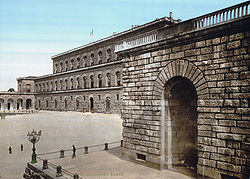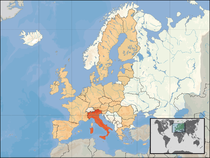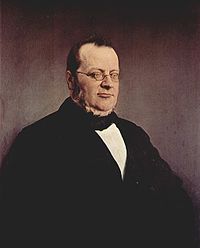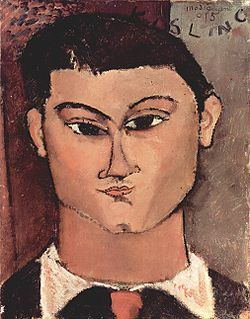- Portal:Italy
-
- Wikipedia portals:
- Culture
- Geography
- Health
- History
- Mathematics
- Natural sciences
- People
- Philosophy
- Religion
- Society
- Technology
Italy portal
Portale ItaliaItaly
 /ˈɪtəli/ (help·info) (Italian: Italia, [iˈta:lja]), officially the Italian Republic (Italian: Repubblica Italiana), is a country located on the Italian Peninsula in Southern Europe and on the two largest islands in the Mediterranean Sea, Sicily and Sardinia. Italy shares its northern, Alpine boundary with France, Switzerland, Austria and Slovenia. The independent states of San Marino and the Vatican City are enclaves within the Italian Peninsula, and Campione d'Italia is an Italian exclave in Switzerland. The territory of Italy covers 301,338 km² and is influenced by a temperate seasonal climate. With 60.2 million inhabitants, it is the sixth most populous country in Europe, and the twenty-third most populous in the world.
/ˈɪtəli/ (help·info) (Italian: Italia, [iˈta:lja]), officially the Italian Republic (Italian: Repubblica Italiana), is a country located on the Italian Peninsula in Southern Europe and on the two largest islands in the Mediterranean Sea, Sicily and Sardinia. Italy shares its northern, Alpine boundary with France, Switzerland, Austria and Slovenia. The independent states of San Marino and the Vatican City are enclaves within the Italian Peninsula, and Campione d'Italia is an Italian exclave in Switzerland. The territory of Italy covers 301,338 km² and is influenced by a temperate seasonal climate. With 60.2 million inhabitants, it is the sixth most populous country in Europe, and the twenty-third most populous in the world.The land known as Italy today has been the cradle of European cultures and peoples, such as the Etruscans and the Romans. Italy's capital, Rome, was for centuries the political center of Western civilization, as the capital of the Roman Empire. After its decline, Italy would endure numerous invasions by foreign peoples, from Germanic tribes such as the Lombards and Ostrogoths, to the Normans and later, the Byzantines, among others. Centuries later, Italy would become the birthplace of the Renaissance,[1] an immensely fruitful intellectual movement that would prove to be integral in shaping the subsequent course of European thought.
Through much of its post-Roman history, Italy was fragmented into numerous kingdoms and city-states (such as the Kingdom of Sardinia, the Kingdom of the Two Sicilies and the duchy of Milan), but was unified in 1861,[2] a tumultuous period in history known as the "Risorgimento". In the late 19th century, through World War I, and to World War II, Italy possessed a colonial empire, which extended its rule to Libya, Eritrea, Italian Somaliland, Ethiopia, Albania, Rhodes, the Dodecanese and a concession in Tianjin, China.[3] Italy was a founding member of the European Community (EC) in 1957, which became the European Union in 1993. It is part of the Schengen zone and adopted the European currency, the euro, in 1999.
Modern Italy is a democratic republic and a developed country with the eighth-highest quality of life index rating in the world.[4] Italy enjoys a high standard of living, and is the world's 18th most developed country.[5] It is a founding member of what is now the European Union, having signed the Treaty of Rome in 1957, and it is a founding member of the North Atlantic Treaty Organization (NATO). It is a member of the G8 and G20, having the world's seventh-largest nominal GDP, and is also a member state of the Organisation for Economic Co-operation and Development (OECD), the World Trade Organization (WTO), the Council of Europe, and the Western European Union. It has the world's eight-largest defence budget and shares NATO's nuclear weapons.
Italy, especially Rome, has an important place in political, military and cultural affairs, with worldwide organizations such as FAO (Food and Agriculture Organization),[6] International Fund for Agricultural Development (IFAD), Glocal Forum,[7] World Food Programme (WFT), and the NATO Defence College being headquartered in the country and the city. The country's European political, social and economic influence make it a major regional power, alongside the United Kingdom, France, Germany, and Russia.[8][9][10][11][12] The country has a high public education level, high labour force,[13] is a globalised nation,[14] and also has 2009's sixth best international reputation.[15] Italy also has the world's 19th highest life expectancy, after New Zealand and Bermuda.[16] Italy is the world's fifth most visited country, with over 43.7 million international arrivals,[17] and boasts a long tradition of excellence in all the arts and sciences, including the fact that Italy has the world's greatest number of UNESCO World Heritage Sites to date (44).
Featured article
 Early, tinted 20th-century photograph of the Palazzo Pitti, then still known as La Residenza Reale following the residency of King Emmanuel II between 1865–71, when Florence was the capital of Italy.
Early, tinted 20th-century photograph of the Palazzo Pitti, then still known as La Residenza Reale following the residency of King Emmanuel II between 1865–71, when Florence was the capital of Italy.
The Palazzo Pitti (sometimes called the Pitti Palace) is a vast mainly Renaissance palace in Florence, Italy. It is situated on the south side of the River Arno, a short distance from the Ponte Vecchio. The core of the present palazzo dates from 1458 and was originally the town residence of Luca Pitti, an ambitious Florentine banker. It was bought by the Medici family in 1539 as the official residence of the ruling families of the Grand Duchy of Tuscany.
In the 19th century, the palazzo, by then a great treasure house, was used as a power base by Napoleon, and later served for a brief period as the principal royal palace of the newly-united Italy. In the early 20th century, the palazzo together with its contents was given to the Italian people by King Victor Emmanuel III; subsequently its doors were opened to the public as one of Florence's largest art galleries. Today, housing several minor additions in addition to those of the Medici family, it is fully open to the public.
Featured picture
Did you know
- ...the famous biblical period movies Pier Paolo Pasolini’s "The Gospel According to St. Matthew" (1964), Bruce Beresford’s "King David" (1985) and Mel Gibson’s "The Passion of the Christ" (2004) were filmed in Matera?
- ...that the first Prime Minister of Italy, Camillo Benso, conte di Cavour, was also one of the first Italian landowners to use chemical fertilizers?
- ...that Italy's 1957 Eurovision entry, "Corde Della Mia Chitarra", was so long that it resulted in the introduction of length restrictions for competing songs?
- ...that Poliphilo, the main character in the Renaissance book Hypnerotomachia Poliphili, was said to have felt "extreme delight," "incredible joy," and "frenetic pleasure and cupidinous frenzy" when he saw the buildings depicted in the book?
- ...that the Italian automaker Autobianchi was founded by the bicycle manufacturer Bianchi, tire giant Pirelli and Fiat?
- ...that within a tomb in the town of Bergamo, Italy there is a statue dedicated to the life of Enrico Rastelli, the world's greatest juggler?
People
Camillo Benso, conte di Cavour (or Camillo di Cavour; August 10, 1810 – June 6, 1861) was an Italian statesman and a leading figure in the movement toward Italian unification. He became the first Prime Minister of the new Kingdom of Italy.
Olympics
The XX Olympic Winter Games were held in Turin, Italy from February 10 to 26 in 2006. This was the second time that Italy hosted the Olympic Winter Games, as it had hosted the VII Olympic Winter Games in Cortina d'Ampezzo in 1956, and the third time overall that Italy hosted an Olympic Games, as it had also staged the Games of the XVII Olympiad in Rome in 1960.
More about 2006 Olympic Winter Games
Literature
Invisible Cities (Italian: Le città invisibili) is a novel by Italian writer Italo Calvino. It was published in Italy in 1972 by Giulio Einaudi Editore.
The book explores imagination and the imaginable through the descriptions of cities by the narrator, Marco Polo. The book is framed as a conversation between the aging and busy emperor Kublai Khan, who constantly has merchants coming to describe the state of his empire, and Polo. The majority of the book consists of Polo's descriptions (1-3 pages each) of the 55 cities. Short dialogues between the two characters are interspersed every five to ten cities and are used to discuss various ideas presented by the cities on a wide range of topics including linguistics and human nature.
Italy News
- February 2011: Prime Minister Silvio Berlusconi is indicted for allegedly hiring an under-age prostitute.
- January 2011: Fiat workers approve a new employment contract proposed by CEO Sergio Marchionne.
- December 2010: Silvio Berlusconi narrowly wins a no confidence vote in the Chamber of Deputies.
- June 2010: The national football team are eliminated in the first round of the 2010 World Cup after winning the 2006 tournament.
- May 2010: Veronica Lario files for divorce from Silvio Berlusconi.
- April 2009: An earthquake in L'Aquila, Abruzzo kills 308 people, injures 15,000, and renders over 60,000 homeless.
- April 2008: Former premier Silvio Berlusconi's People of Freedom party leads a centre-right coalition to win a majority in Parliament, making Berlusconi Prime Minister for a third time.
WikiProjects

You are invited to participate in Italy WikiProject, a WikiProject dedicated to developing and improving articles about Italy. Things you can do
Stubs • Building stubs • Geography stubs • History stubs • People stubs • New article announcements
Categories
Paintings
Portrait of Moise Kiesling
Amedeo Modigliani
(1915), Oil on canvas
Brera Gallery, MilanCinema
1900 (also called Novecento) is a 1976 epic film starring Robert de Niro, Gérard Depardieu, Dominique Sanda, Donald Sutherland, Alida Valli and Burt Lancaster, directed by Bernardo Bertolucci. Set in Bertolucci's ancestral region of Emilia, the film chronicles the lives of two men during the political turmoils that took place in Italy in the first half on the 20th century.
Alfredo Berlinghieri (de Niro) and Olmo Dalco (Depardieu) are born on the same day in 1900, but belong to opposite ends of the social spectrum. Alfredo is the son of a rich landowner, while Olmo is a misbegotten peasant son. As Alfredo is somewhat rebellious and despises the falseness of his family, in particular his father, he befriends Olmo, who is brought up as a socialist.
After World War I, their friendship continues, but slowly the rise of the fascists as embodied by the sadistic Attila (Donald Sutherland) separates them. Alfredo chooses the side of Fascism, while Olmo fights for the communists.
Other portals
Cite error: There are<ref>tags on this page, but the references will not show without a{{Reflist}}template or a<references />tag; see the help page.Categories:- Italy portal
- European portals
Wikimedia Foundation. 2010.






